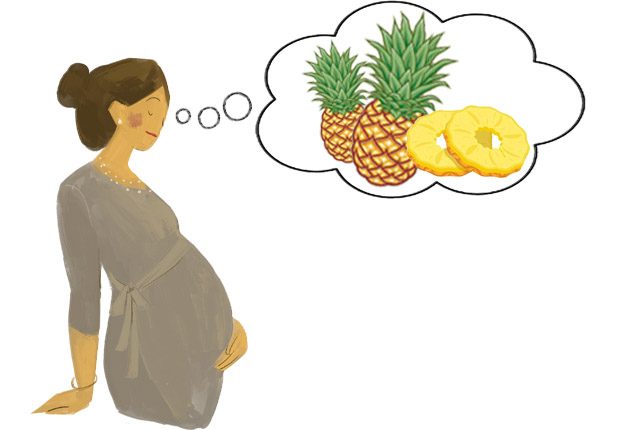Has anyone advised you to avoid pineapple because it can cause early miscarriage or bring on labor? If you like pineapple, I suggest reading this article before completely giving up on it during pregnancy.

So, can you eat pineapple during pregnancy?
Yes, you can eat pineapple during pregnancy!
Pineapple is a healthy source of vitamins and nutrients and is generally safe to eat while pregnant.
However, it is important to note that consuming large amounts of pineapple or unripe pineapple can cause discomfort, including diarrhea.
Can you drink pineapple juice during pregnancy?
You can drink pineapple juice during pregnancy, but choose it wisely and do not overdo it.
Although pineapple juice is a good source of vitamins and minerals, consuming large amounts can cause discomfort, including diarrhea and intestinal spasms.
Pregnant women should also remember that juice can contain high levels of sugar. Therefore it is best to consume it in moderation or to opt for a no sugar added version.
Can you take pineapple supplements during pregnancy?
Consuming pineapple supplements during pregnancy is not recommended without consulting a healthcare professional first!
Pineapple supplements contain higher levels of Bromelain, an enzyme found in pineapple. Because there were no studies about the safety of more substantial amounts of Bromelain for pregnant women, precaution is advised.
Another factor against pineapple supplements is that the Food and Drug Administration (FDA) does not regulate supplements, so they may contain other ingredients that could harm you or your baby.
It’s always best to consult a healthcare professional before taking any supplements during pregnancy!
The best way to get essential vitamins and minerals during pregnancy is to eat a well-balanced diet with many fruits and vegetables rather than rely on supplements.
How much pineapple is safe during pregnancy?
The FDA has no specific recommendations about pineapple eating during pregnancy. So, when eating pineapple during pregnancy, you should rely on their universal guidelines. These include eating a balanced diet full of different fruits and vegetables that provide essential vitamins and minerals for proper baby development and growth.
It is generally safe to consume moderate amounts of pineapple during pregnancy. One serving of pineapple (about four to eight ounces or one cup of diced pineapple) is safe to consume during pregnancy.
Benefits of eating pineapple during pregnancy
Pineapples are full of vitamins, minerals, and fibers. Thus there are several potential benefits to eating pineapple during pregnancy.
Pineapple is beneficial for a pregnant woman and her baby because of:
- Vitamin C: Pineapple is a good source of Vitamin C, which is essential for developing the baby’s bones and teeth. It also helps the mother’s body absorb iron from plant-based foods.
- Vitamin B6: Pineapple contains Vitamin B6, essential for the baby’s brain development.
- Potassium: Pineapple is also a good source of potassium, which helps to regulate blood pressure, and helps to maintain the balance of fluids in the body.
- Fiber: Pineapple is a good source of dietary fiber that can help prevent constipation, a common pregnancy complaint.
- Anti-inflammatory properties: Pineapple contains an enzyme called bromelain, which has anti-inflammatory properties and may help to reduce swelling and ease aches and pains.
Are there any risks of eating pineapple during pregnancy?
While eating pineapple in moderate amounts during pregnancy is generally considered safe, there are some potential risks.
- Digestive discomfort: Consuming large amounts of pineapple or consuming unripe pineapple can cause discomfort, including diarrhea and intestinal spasms.
- Allergies: Some people may be allergic to pineapple. The pineapple allergy can cause hives, itching, and breathing difficulties.
- Interaction with Medications: Bromelain, an enzyme found in pineapple, can interact with blood-thinning medications such as warfarin, so it’s important to talk to your healthcare professional if you’re on any blood-thinning medication.
- Risk of consuming mold: If the pineapple is not properly cleaned or stored, it may contain mold, which can harm a pregnant woman and her baby.
It’s always best to consult a healthcare professional to ensure you get the appropriate amount of vitamins and minerals during pregnancy. It’s also important to note that consuming a balanced diet with various fruits and vegetables is the best way to ensure you get all the essential nutrients you need during pregnancy.
Does pineapple induce labor?
Some anecdotes suggest consuming large amounts of pineapple may help induce labor.
The myth attributes this to the enzyme in pineapple called bromelain, which is believed to soften the cervix and potentially stimulate contractions.
However, these claims have no scientific basis, as no studies have been conducted yet.
